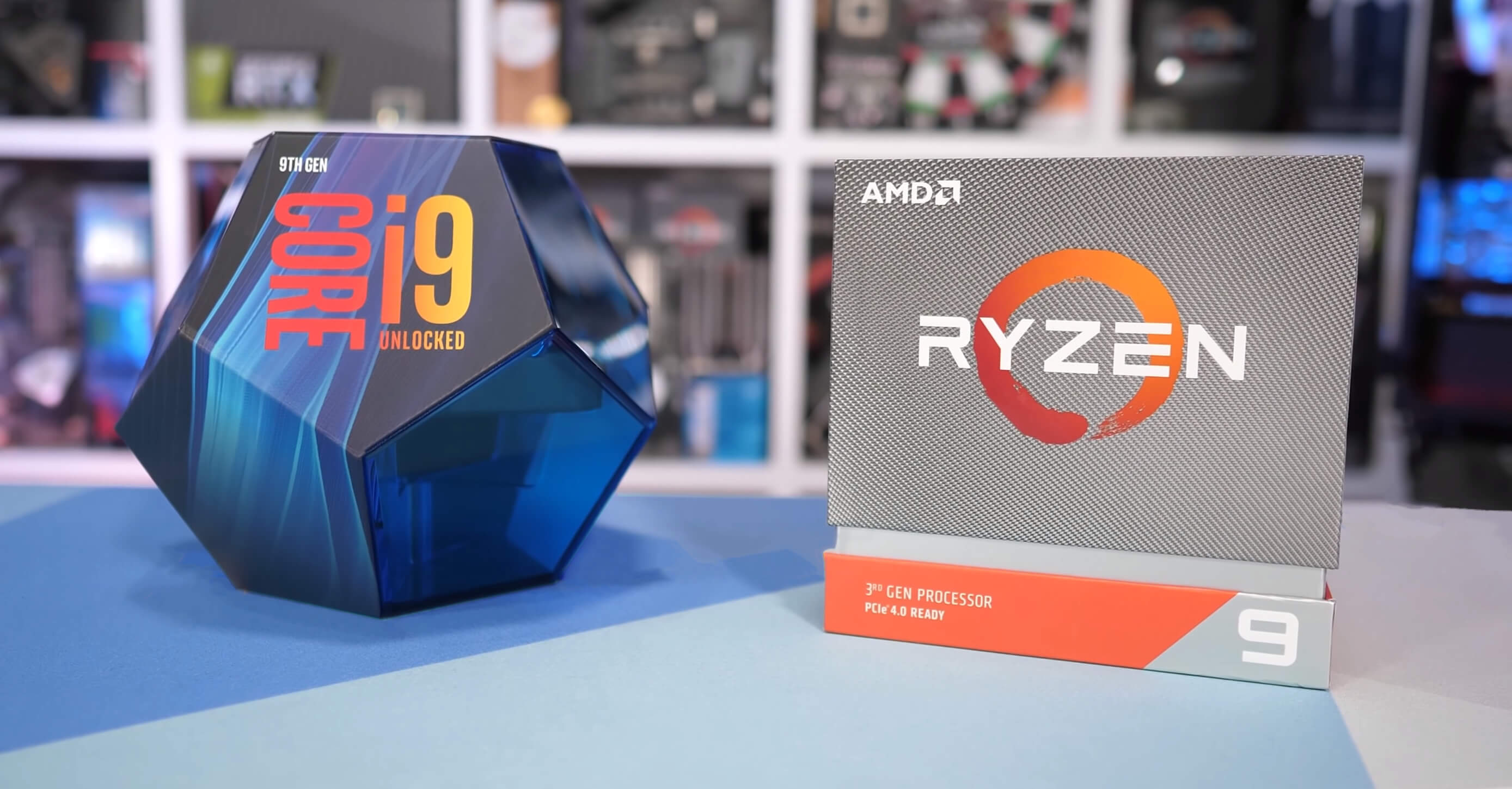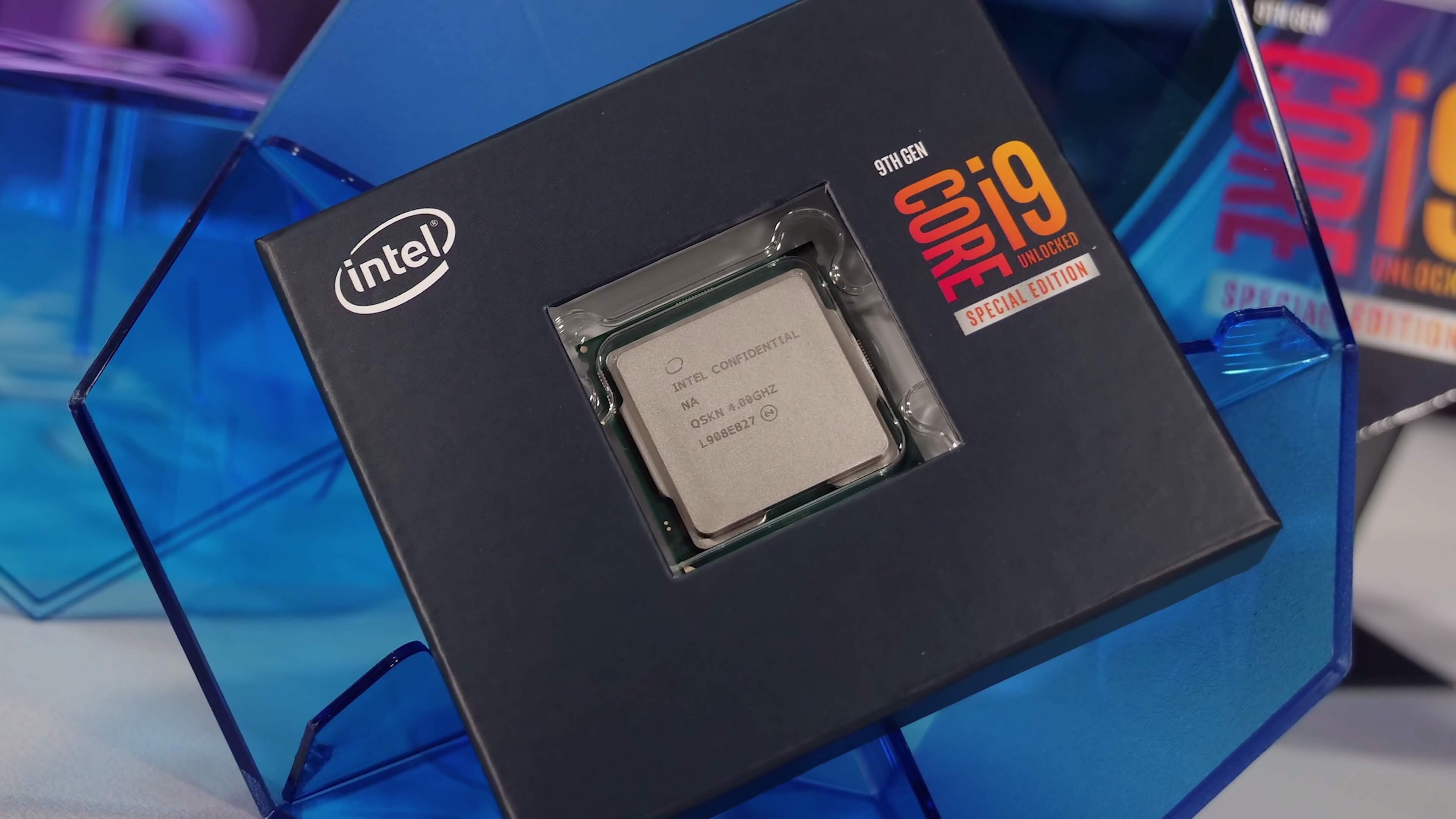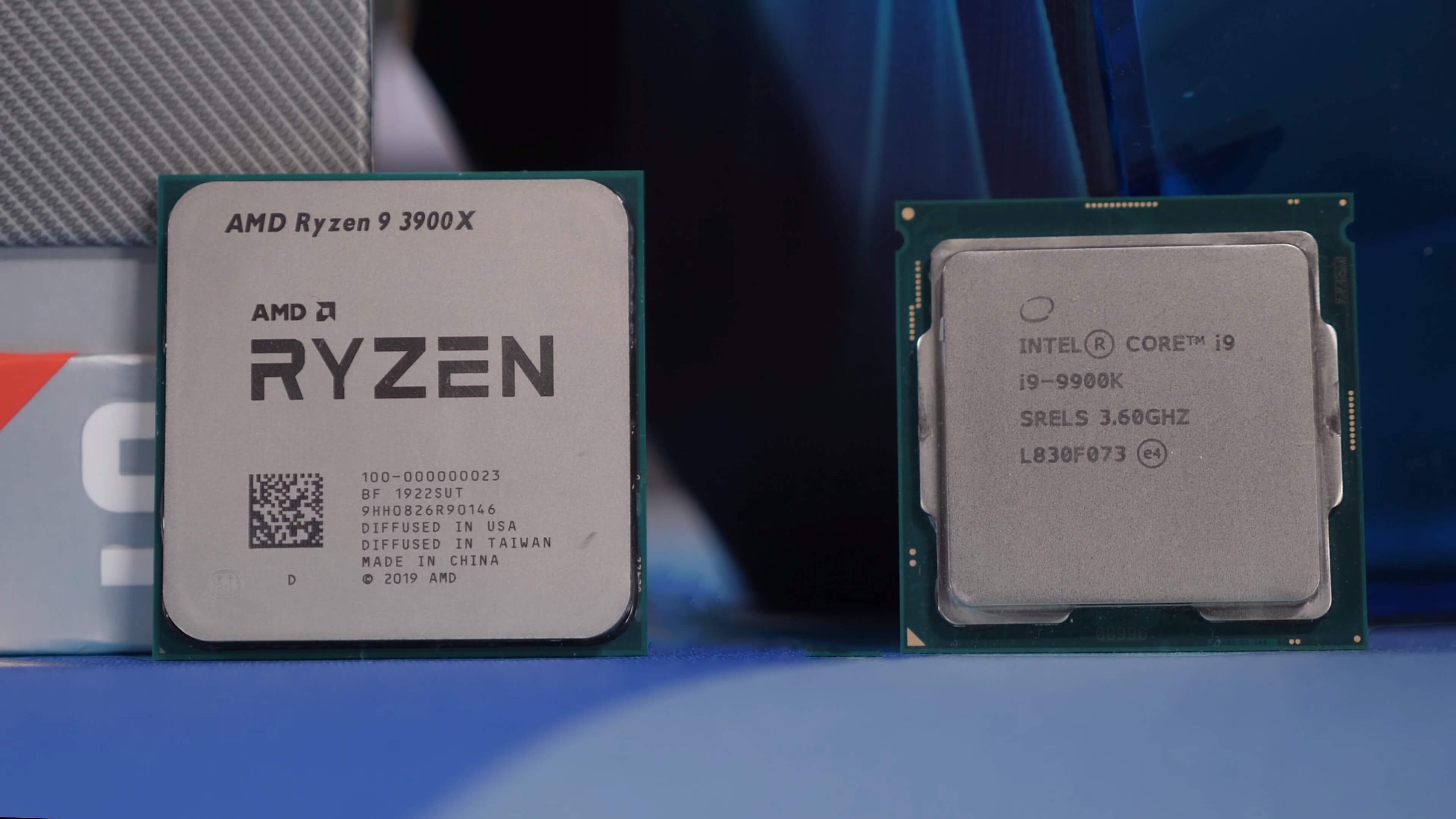Today we're comparing the Ryzen 9 3950X and Core i9-9900KS in a massive number of games, using one of G.Skill's most premium 16GB memory kits, the Trident Z Neo DDR4-3600 CL14. For those of you spending $600 or $750 on a CPU, purchasing best in class DDR4 memory doesn't seem like a stretch, but the main reason we went with this memory was so we could bring you a head to head comparison between AMD and Intel processors using manually tuned timings.
It was discovered in the early days of AMD's Zen architecture that memory bandwidth and latency were crucial for maximizing performance of Ryzen processors. Manually tuning up the secondary and tertiary timings can consistently improve Ryzen's performance in games.
In other words, this is a comparison of Intel and AMD's top desktop CPUs that do not belong to their HEDT series, with both processors tweaked for maximum memory performance.
For this Ryzen 9 3950X vs. Core i9-9900KS comparison we have tested a total of 18 games at 1080p using a GeForce RTX 2080 Ti. Both CPUs were tested in their stock out of the box configuration with XMP for the Trident Z Neo DDR4-3600 CL14 memory loaded. Then we have added a second configuration which sees the G.Skill memory timings manually tuned. The Core i9 was installed on a Gigabyte Z390 Aorus Ultra and, while Ryzen 9 used the Gigabyte X570 Aorus Master.
Before we jump into the gaming benchmarks, here's a quick look at memory bandwidth. As you can see the tuned timings only boost bandwidth by 4% for the 3950X and 3% for the 9900KS.
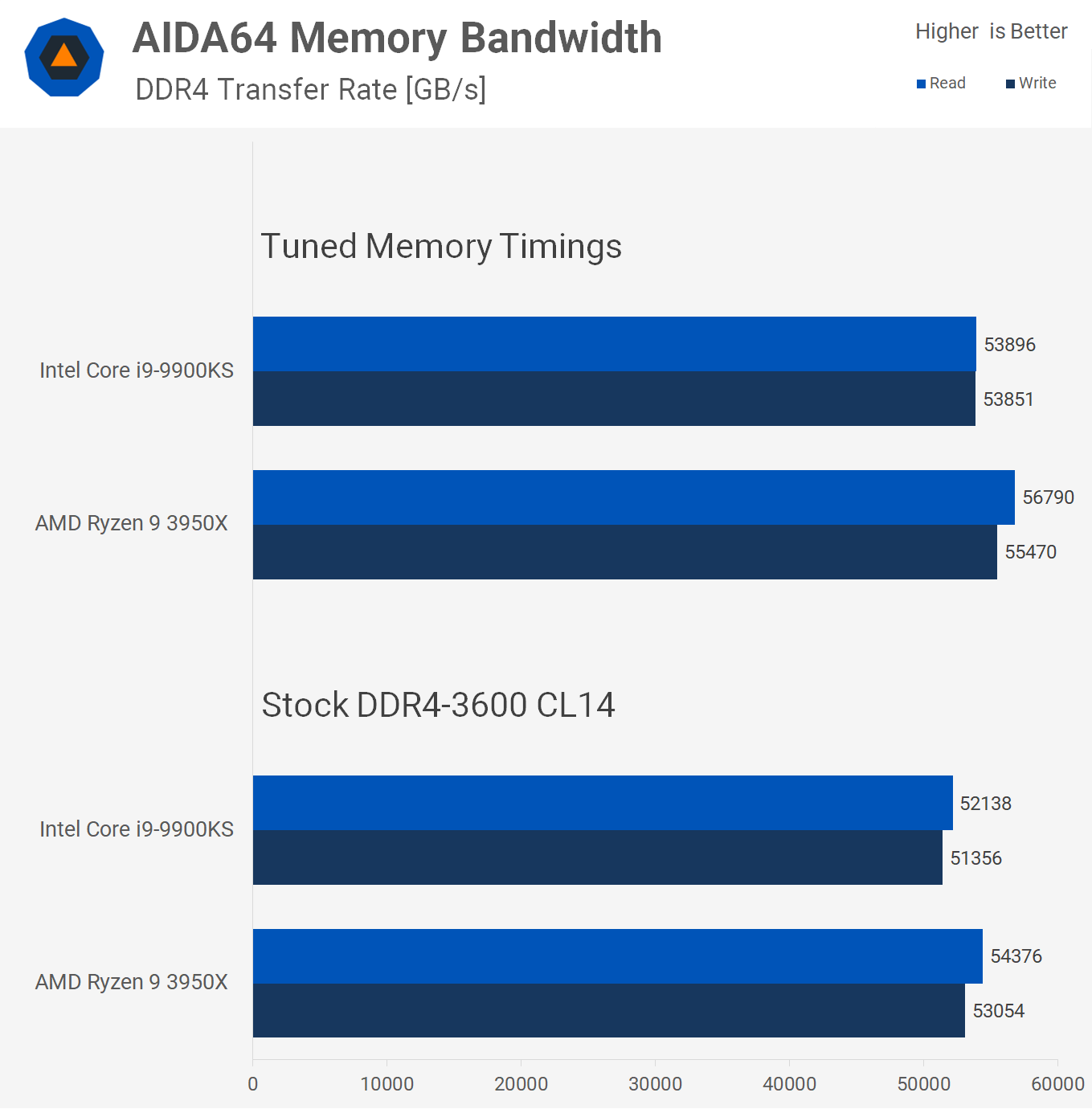
Memory latency for the 3950X was also only reduced by 5% and 3% for the 9900KS, so based on those figures you wouldn't expect much of a performance gain in games, but as you're about to see that's not the case.
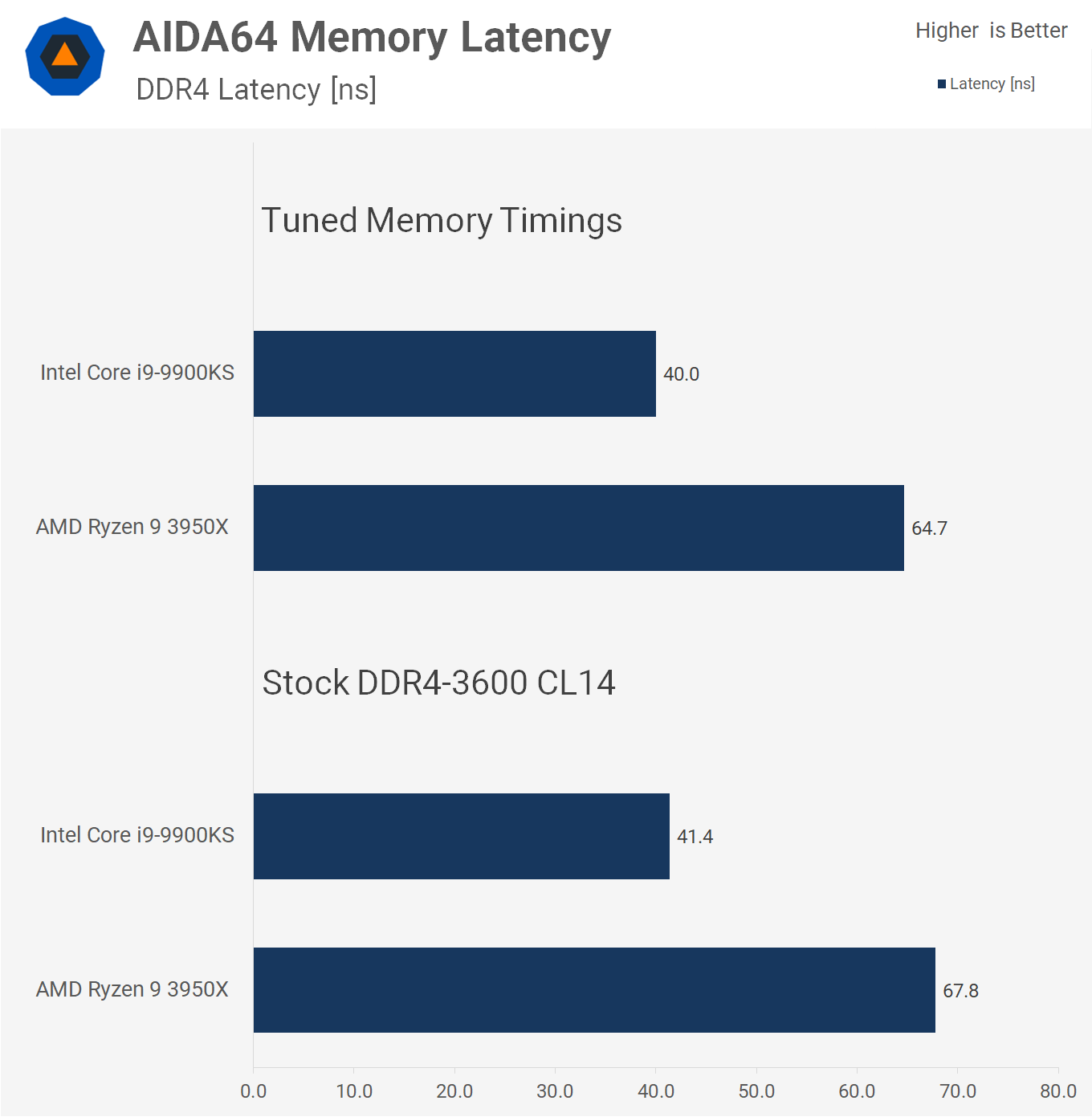
Gaming Benchmarks
The first game we tested is Hitman 2 where the 9900KS is 21% faster than the 3950X out of the box, quite a significant performance margin. However, the 3950X enjoys a massive 24% performance boost with the tuned memory, going from 117 fps on average up to an impressive 145 fps.
The 9900KS also benefits from tuned memory though, not quite to the same degree as Ryzen but we still see a 10% performance uplift in this title which is enough for Intel to keep the lead, albeit a smaller 8% margin.
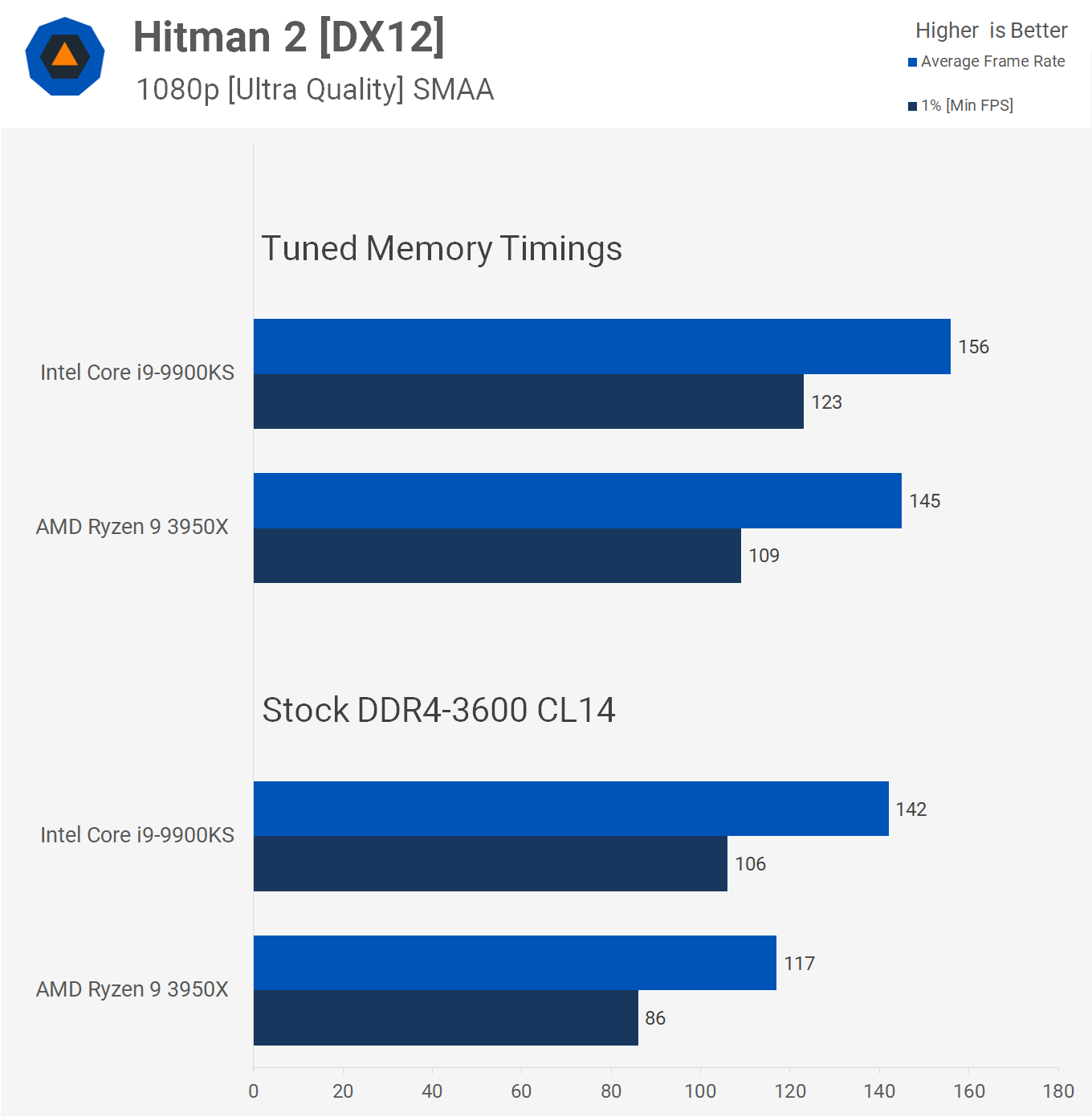
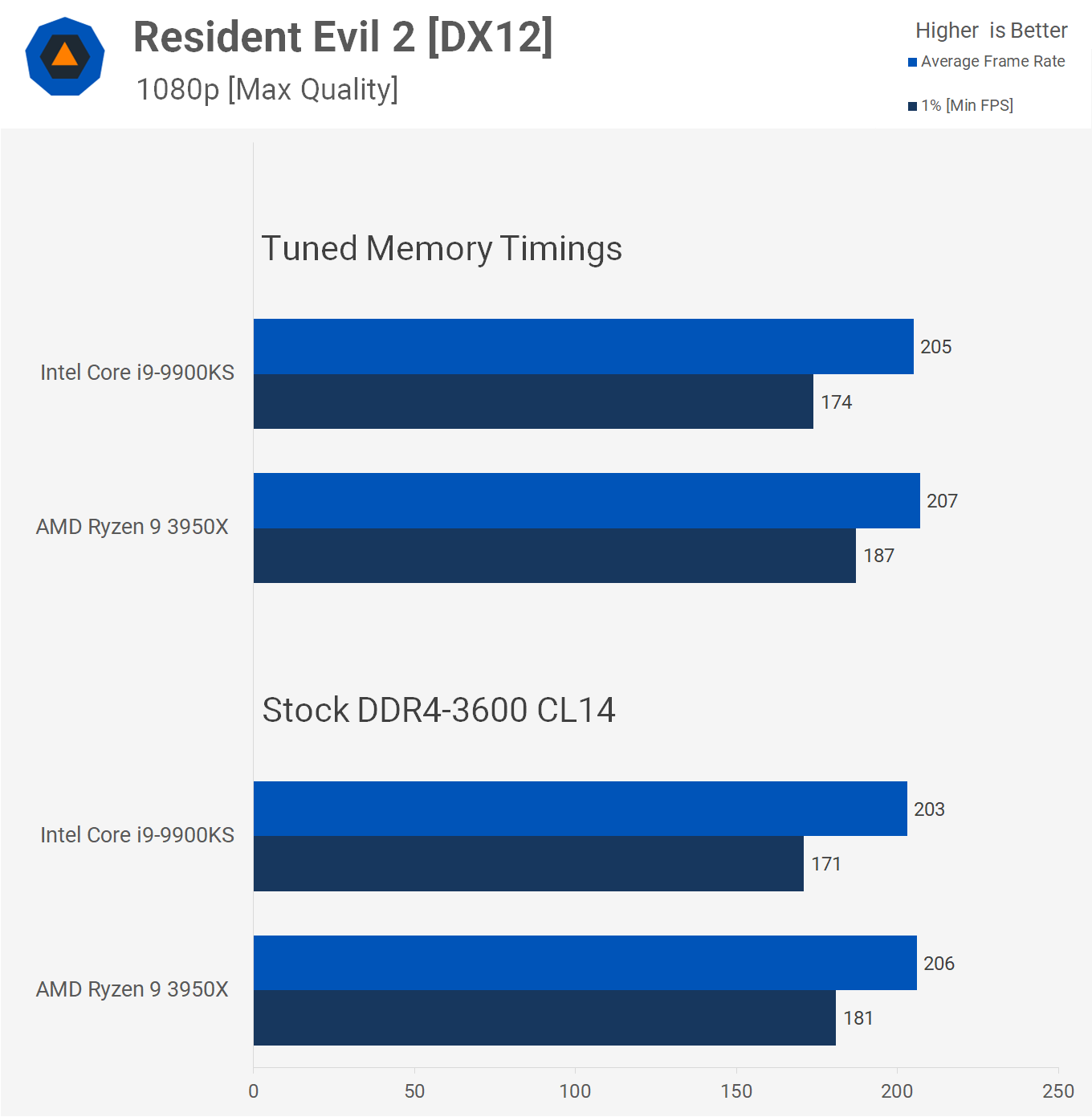
Next up we have Resident Evil 2 and here the 3950X performs exceptionally well with the CL14 DDR4-3600 memory, slightly edging out the 9900KS both stock and tuned. For this title the tuned memory has almost no impact on performance, at most we see a 3% increase in 1% low performance.
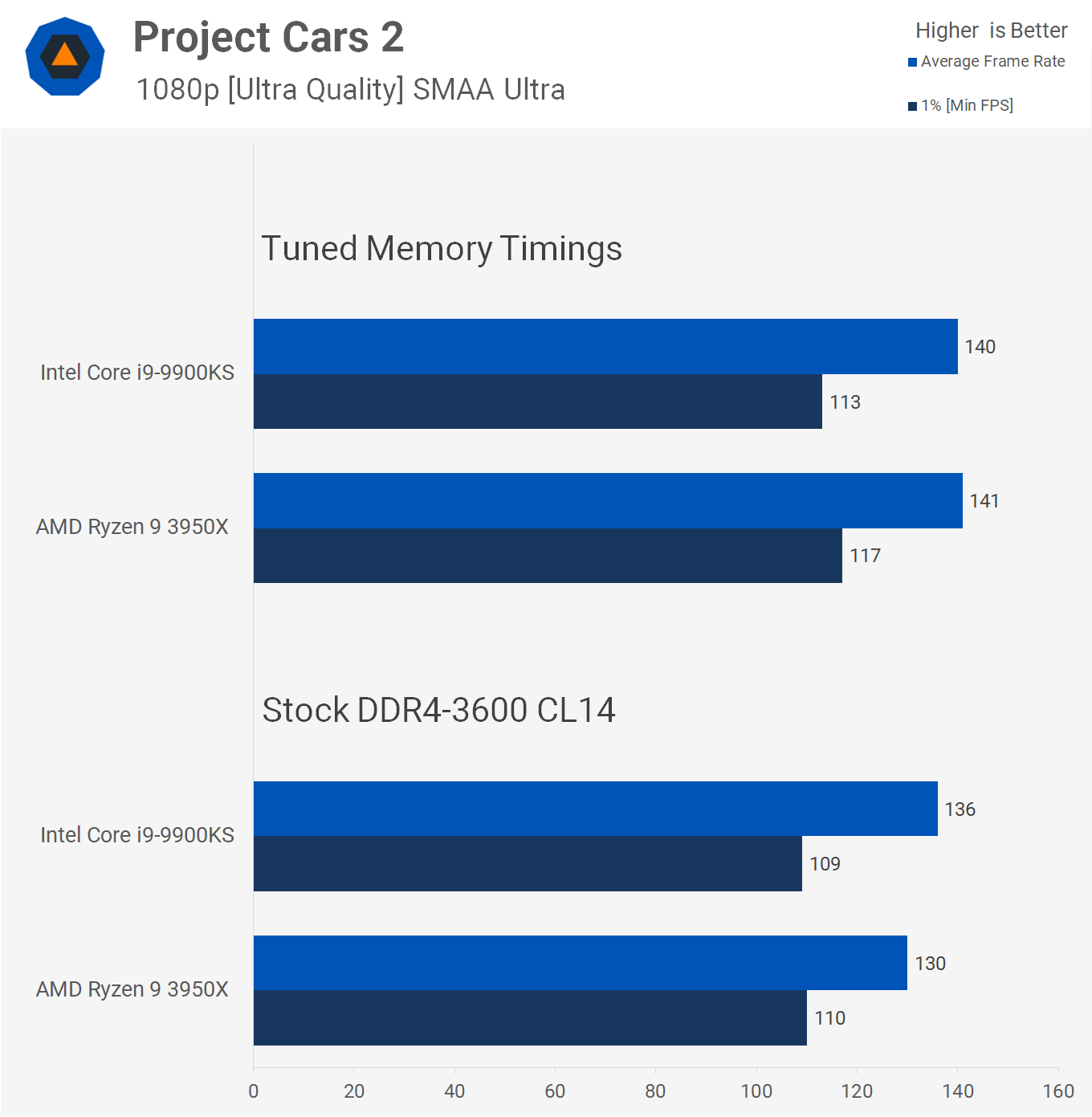
Moving on to Project Cars 2 we see another mild 3% performance gain for the 9900KS.
The 3950X gained a more noteworthy 11 fps for an 8% increase in frame rate. Not mind-blowing but it's enough to place AMD ahead of Intel in this title, particularly when looking at 1% low performance.

Gains in Tom Clancy's Rainbow Six Siege are uneventful for both processors. We're looking at a ~3% increase which has Intel offering a 4% performance increase, though with tightly grouped 1% low performance the experience was identical using either CPU.

Here are some interesting results in Battlefield V. Tuning up the memory with the 9900KS has virtually no impact on performance, besides a 5% improvement in 1% low performance. That's nothing compared to the 21% increase in 1% low performance seen by the 3950X. The average frame rate was also boosted by 17%. This was enough to put the 3950X just ahead of the 9900KS, though it was slightly down for the 1% low metric. Still once turned up, these CPUs enable an identical gaming experience.

Out of the box the 9900KS is 5% faster than the 3950X when testing with Assassin's Creed Odyssey, or an extra 3 fps. With the tuned memory that margin shrinks to 2.5% and now we're looking at a 1-2 fps difference, so the same gaming experience with either processor.
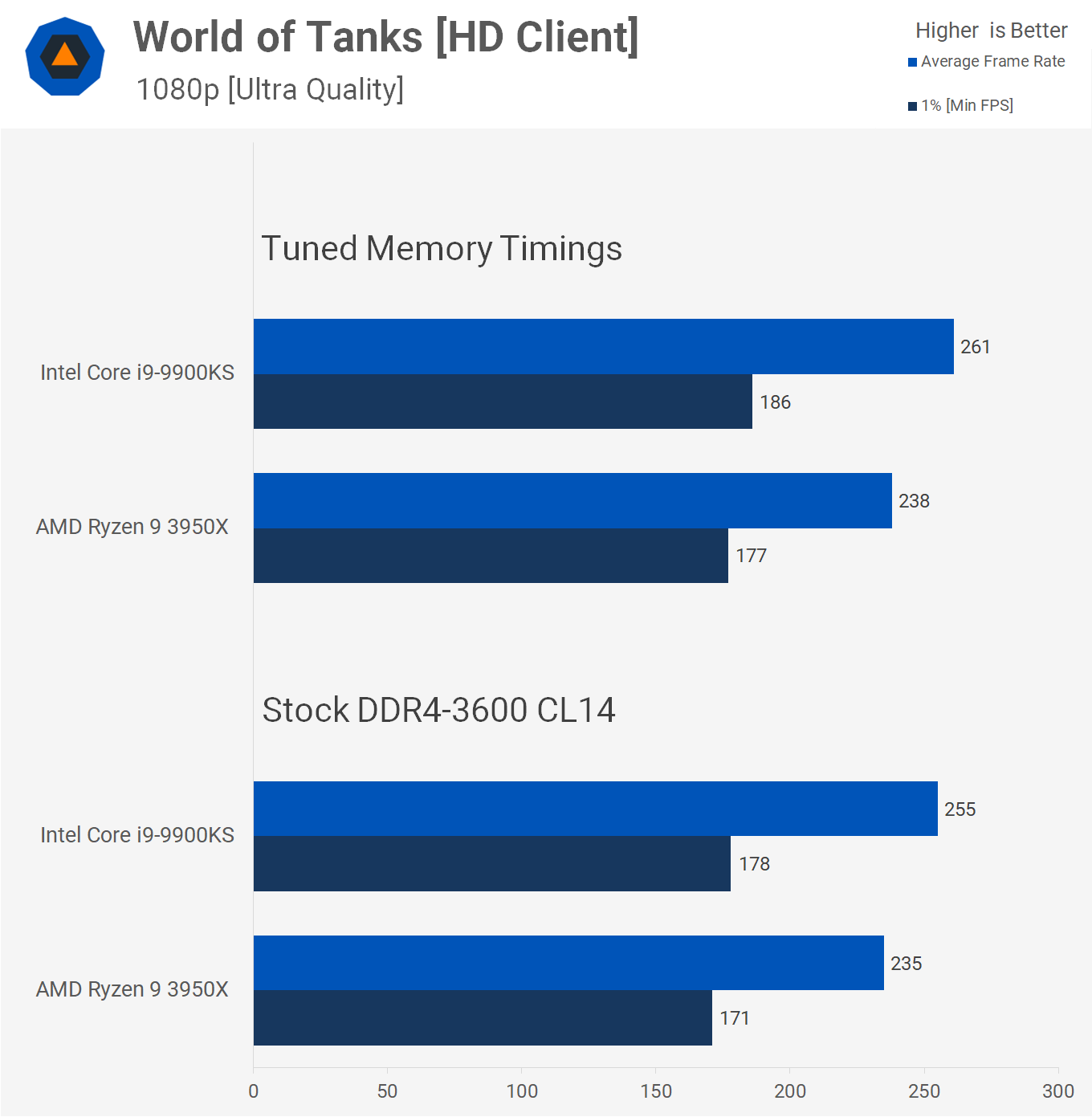
Moving on we have the World of Tanks results and here we're looking at up to a 4% increase from the memory tuning, pretty pointless for this title. Also these numbers can't be compared to prior World of Tanks results as we're using an updated replay for testing.
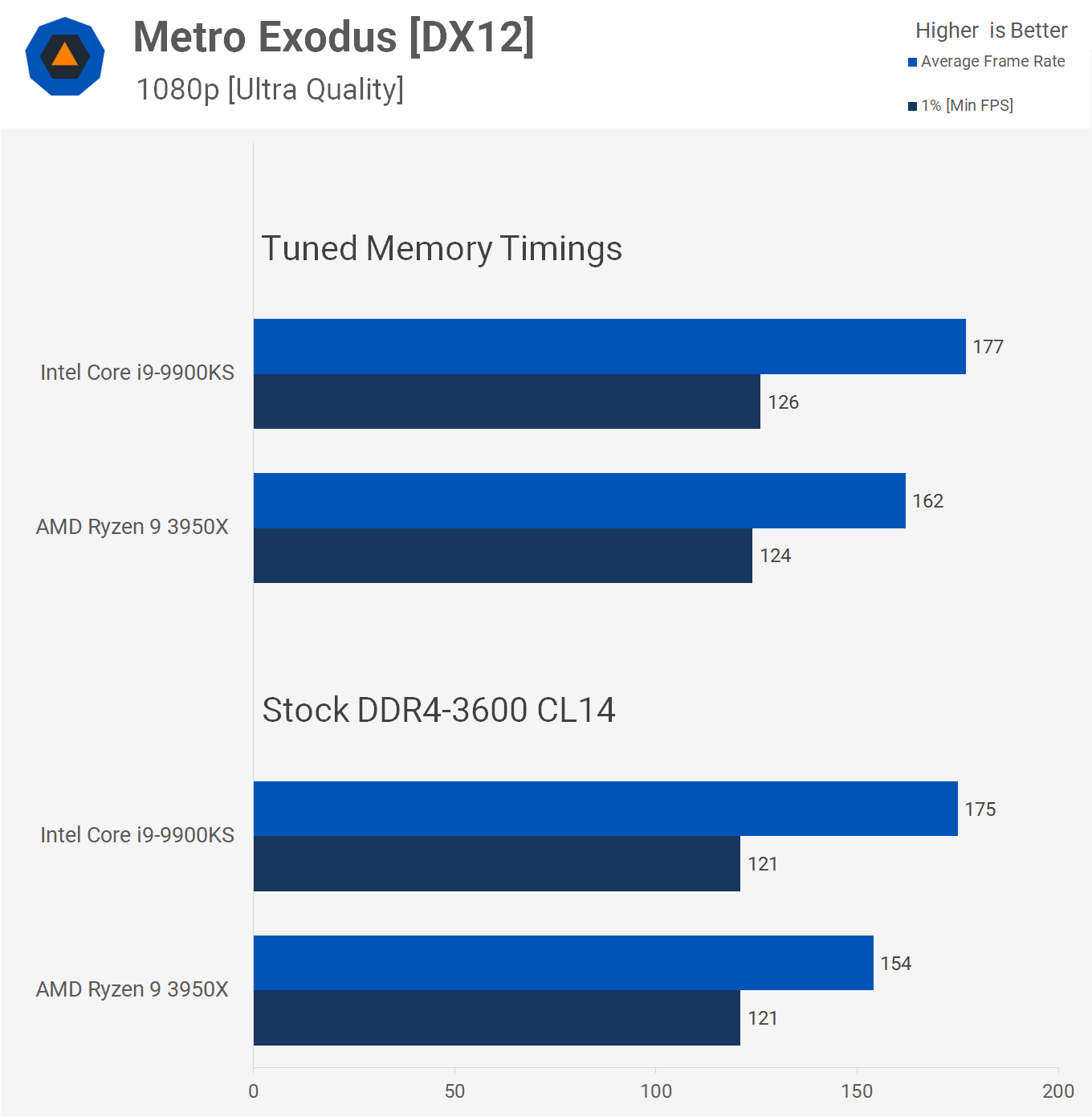
We've also updated our Metro Exodus test, we're now in a much latter section of the game that is more demanding. Interestingly, although the 1% low performance is identical between the 3950X and 9900KS, the Intel CPU is quite a bit faster when comparing the average frame rate, 14% faster out of the box and 9% once both CPUs are using the tuned memory timings.
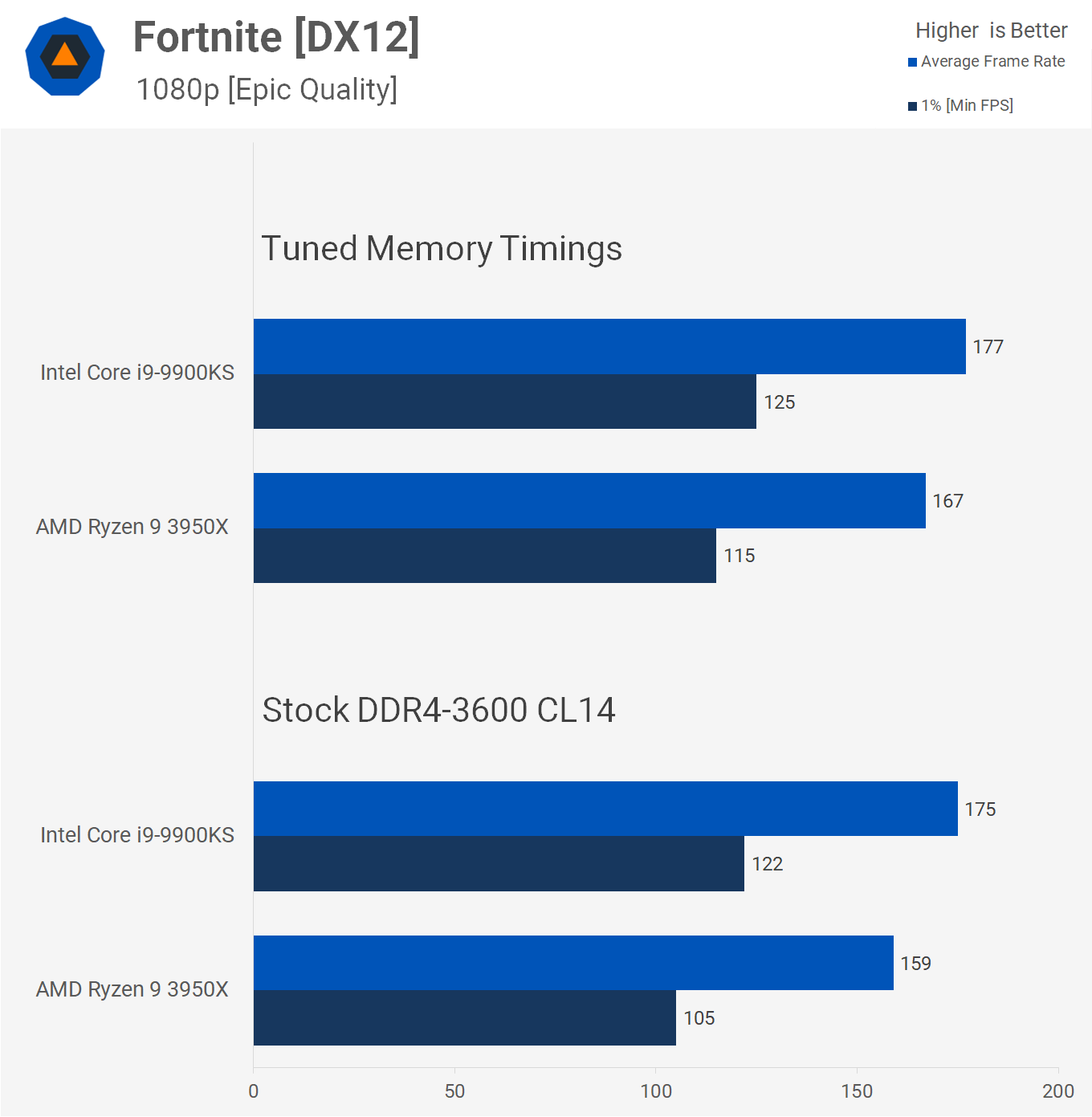
In Fortnite, Intel's Core i9-9900KS sees almost no improvement with the tuned memory, we're talking just 2-3 fps at well over 100 fps. The 3950X enjoys a 5-10% performance boost, but even so once tuned up the 9900KS was still 9% faster when comparing 1% low data.
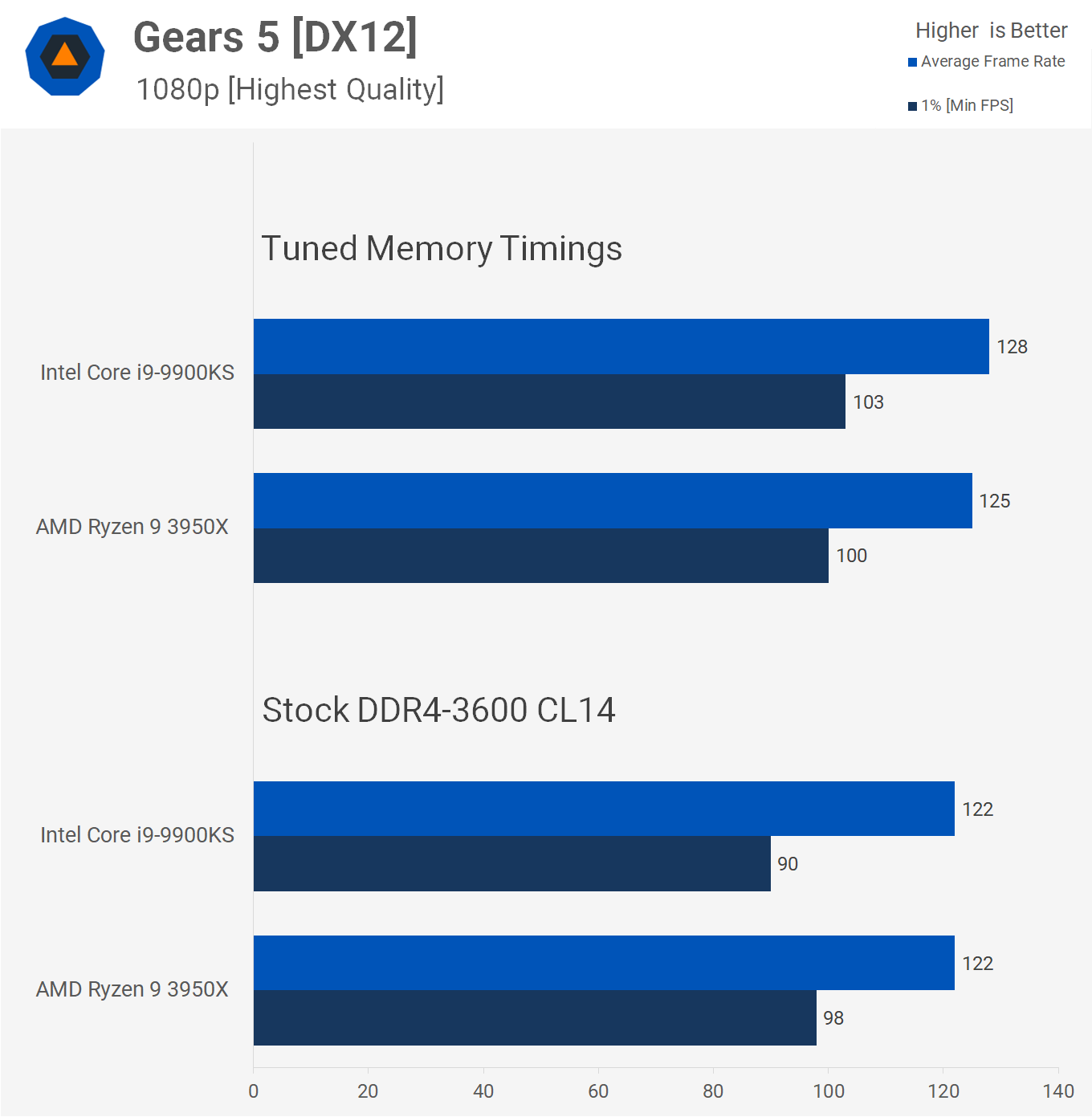
This time it's the 9900KS that benefits the most from the tuned memory as the average frame rate is increased by 5% and the 1% low result by 14%. Even so this meant the 9900KS was just 2.5% faster than the 3950X, so the same performance then.
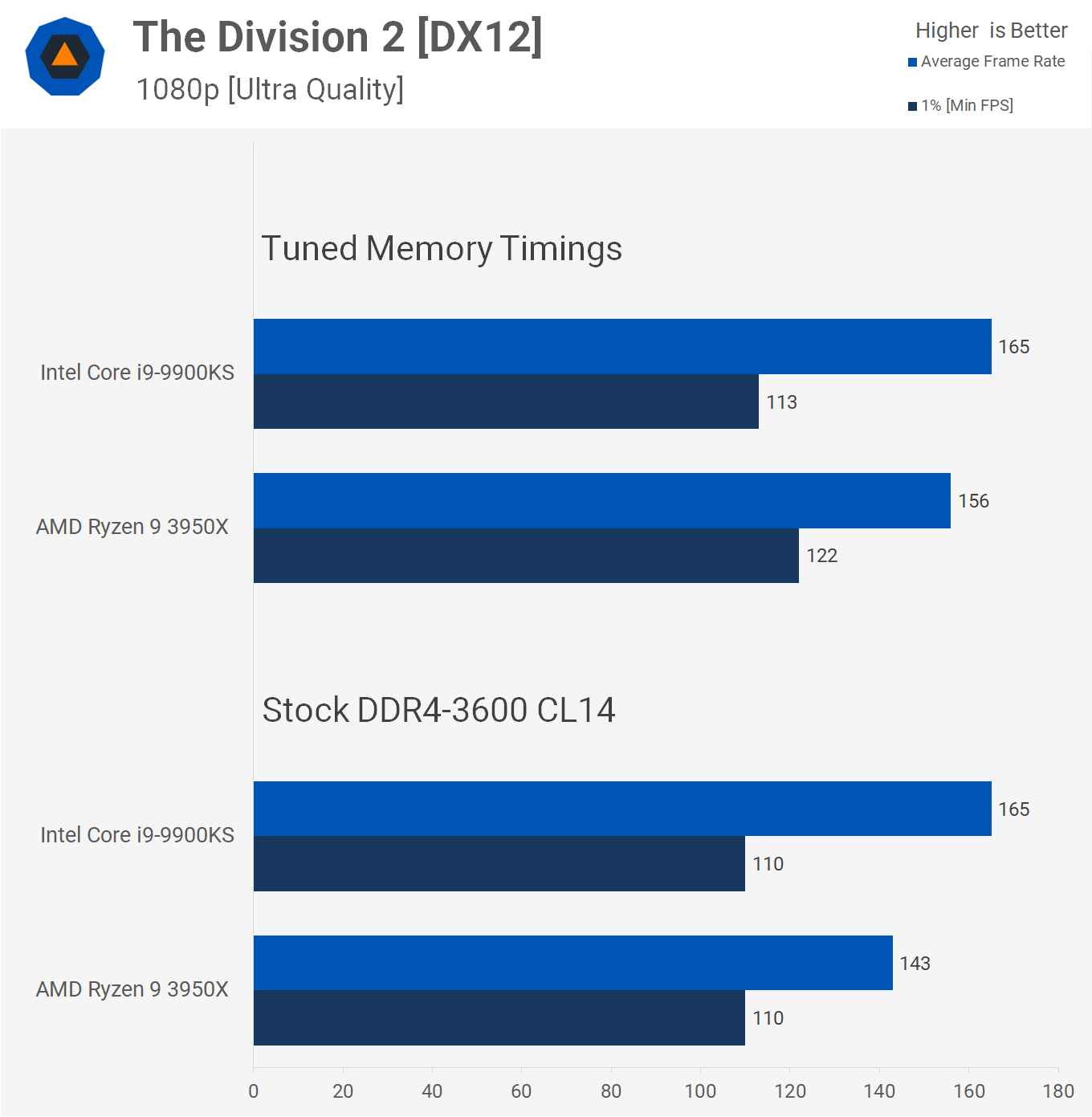
Performance in the The Division 2 is a little unusual, out of the box both CPUs allowed for a 1% low result of 110 fps and yet despite that the average frame rate of the 9900KS was still 15% higher. Once both CPUs were using the tuned timings though the 3950X produced a much better 1% low result and now the 9900KS was just 6% faster when comparing the average frame rate.

The tuned DDR4 memory configuration only provided a 2 to 4% performance uplift for the 9900KS when testing with World War Z. The 3950X wasn't much better as it only saw a 5 to 7% performance boost, though that was enough to reduce the 9900KS lead down to 4%. And on a final note we once again we see both CPUs enabling frame rates so high, that the single digit % margins mean virtually nothing.

When testing with F1 2019 we see little performance difference with the tuned memory timings, though the 9900KS saw its winning margin reduced from 6% down to 3%, so yet another title were the gaming experience is identical even at 1080p with an RTX 2080 Ti.
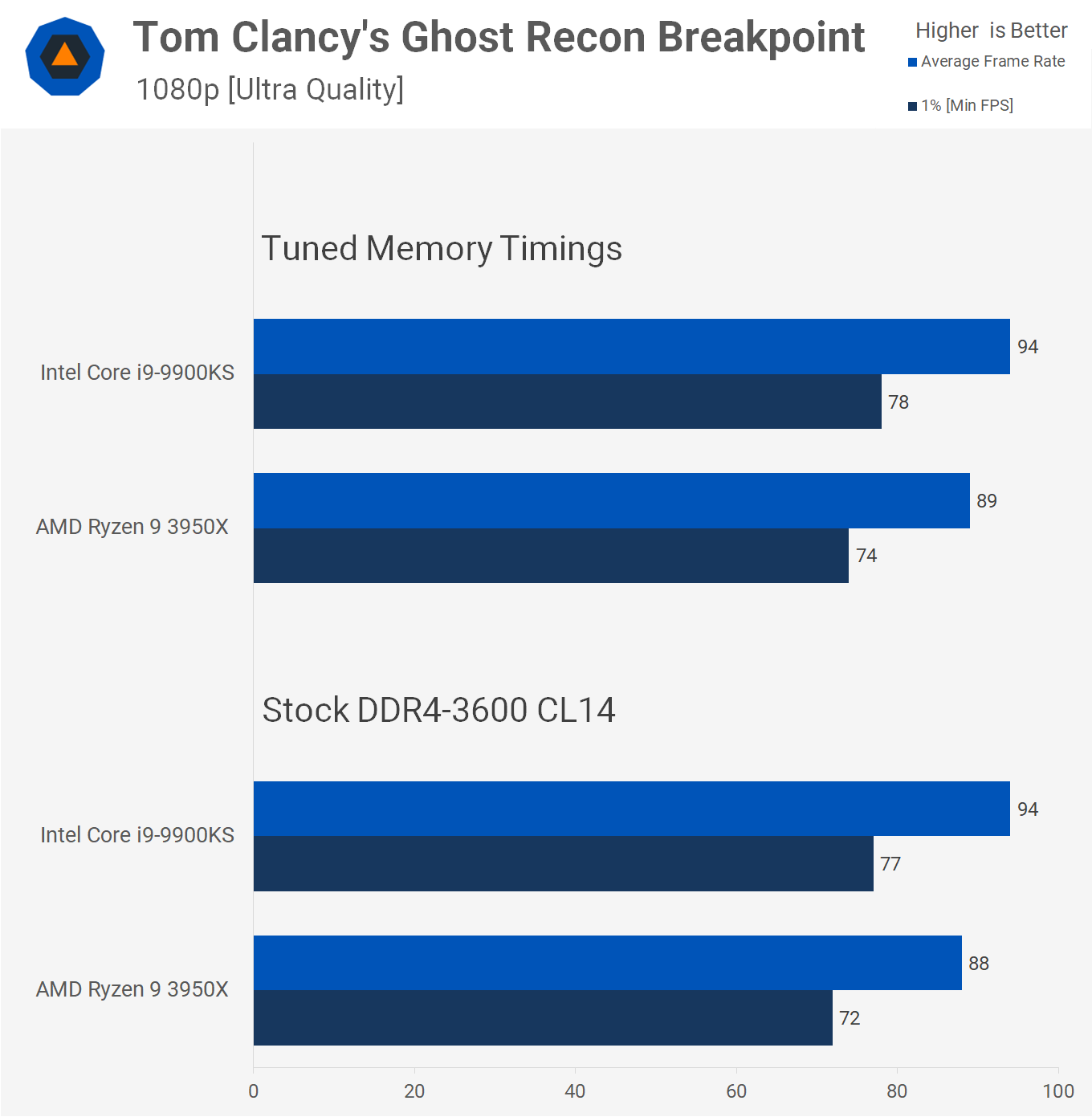
Ghost Recon Breakpoint isn't responsive to the tuned memory, here we see basically no improvement for either CPU and this means the 9900KS was still 6% faster. Pretty terrible optimization in this title though we have to say, less than 100 fps for both CPUs with an RTX 2080 Ti at 1080p.
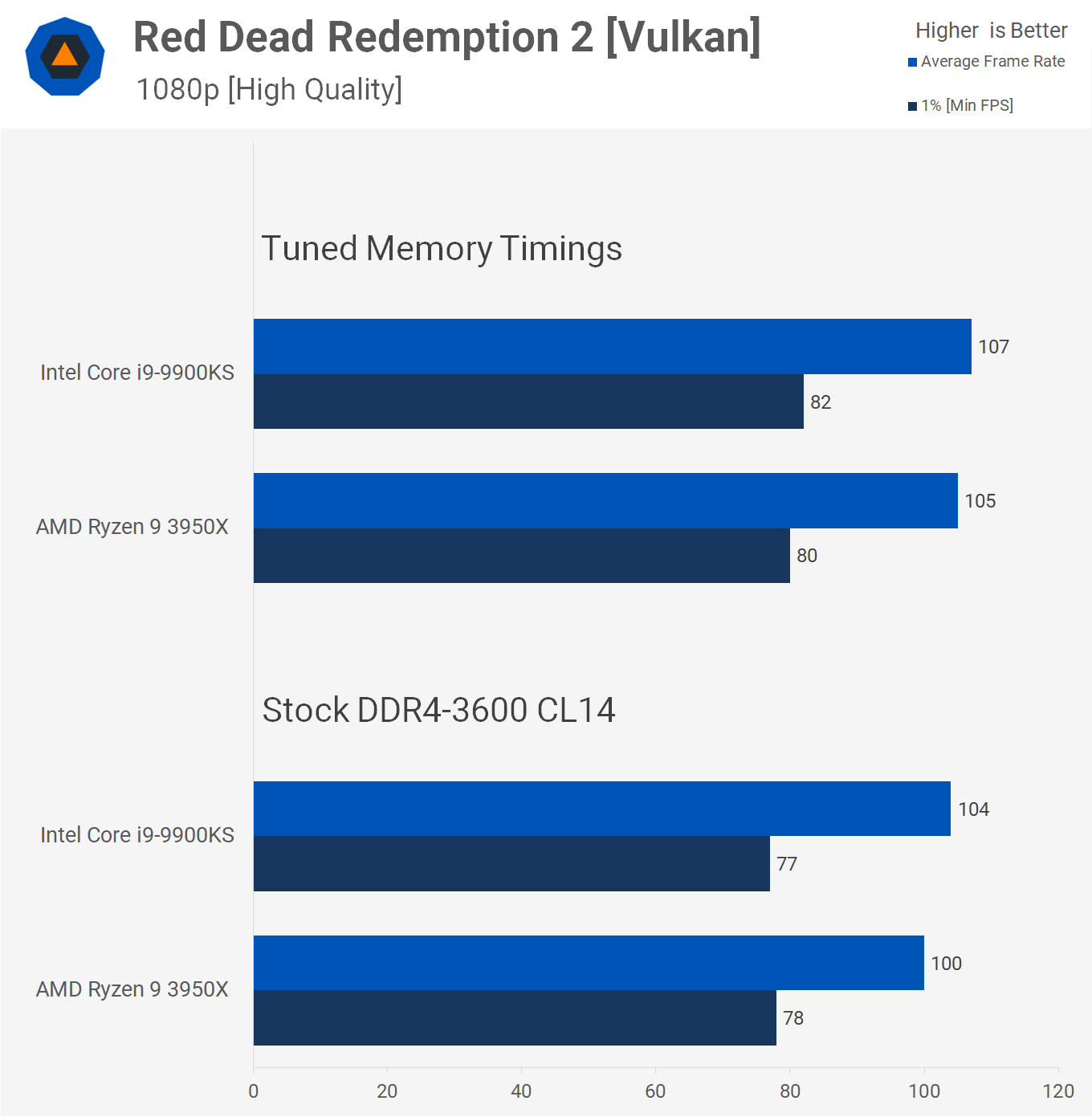
We see a similar thing with Red Dead Redemption 2 if we didn't manually set everything to high. Here we're looking at up to a 5% performance improvement with the turned memory, so nothing worth talking about. The performance margin between the 9900KS and 3950X is minimal.
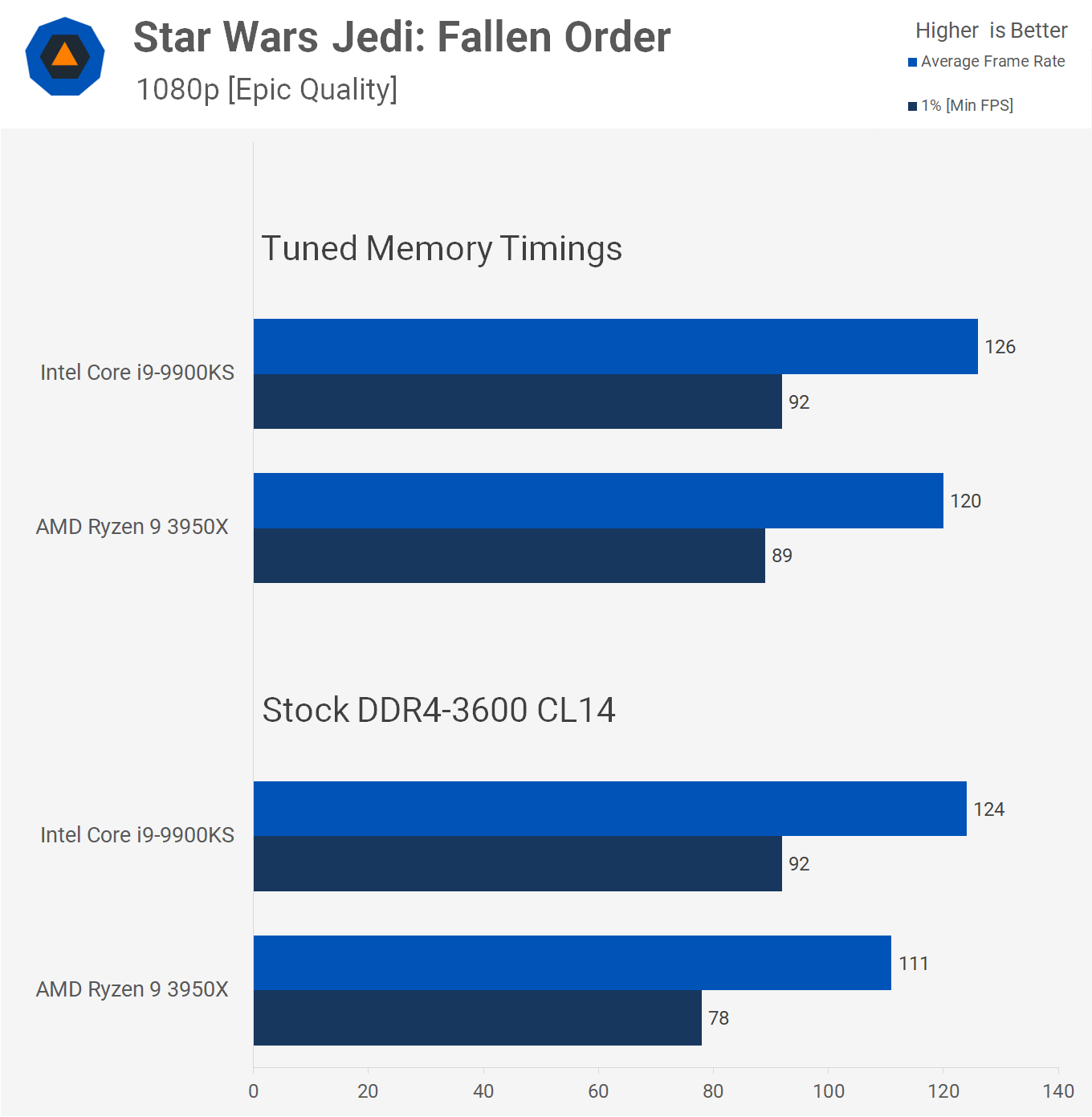
Out of the box the 3950X lags behind quite a bit in Star Wars Jedi: Fallen Order. The 9900KS is 18% faster when comparing 1% low performance and 12% faster for the average frame rate. The tuned memory doesn't improve performance for the 9900KS but it does enable an 8 to 14% performance uplift for the 3950X and now both CPUs are seen delivering comparable performance.

Very small performance gains are seen in Modern Warfare when running the tuned memory and both CPUs delivered virtually identical performance. The 3950X did provide slightly better 1% low performance, though the margins are so small there's simply no chance you'll notice the difference when gaming.

Last up we have Shadow of the Tomb Raider and here the 3950X saw a massive 21% increase in 1% low performance with the tuned memory and a 17% increase for the average frame rate. Meanwhile, Intel saw no improvement in 1% low performance and just a 6% increase for the average frame rate. This means while the 9900KS was 11% faster out of the box, with the tuned memory the 3950X just managed to hit the lead.
Performance summary
The results seemed to be a bit all over the place, sometimes the tuned memory provided strong gains, other times those gains were mild and just as often we saw no gains at all. What did seem clear was the marginal performance difference between the Ryzen 9 3950X and Core i9-9900KS for gaming. To get a better sense of that let's check out the performance across all titles...
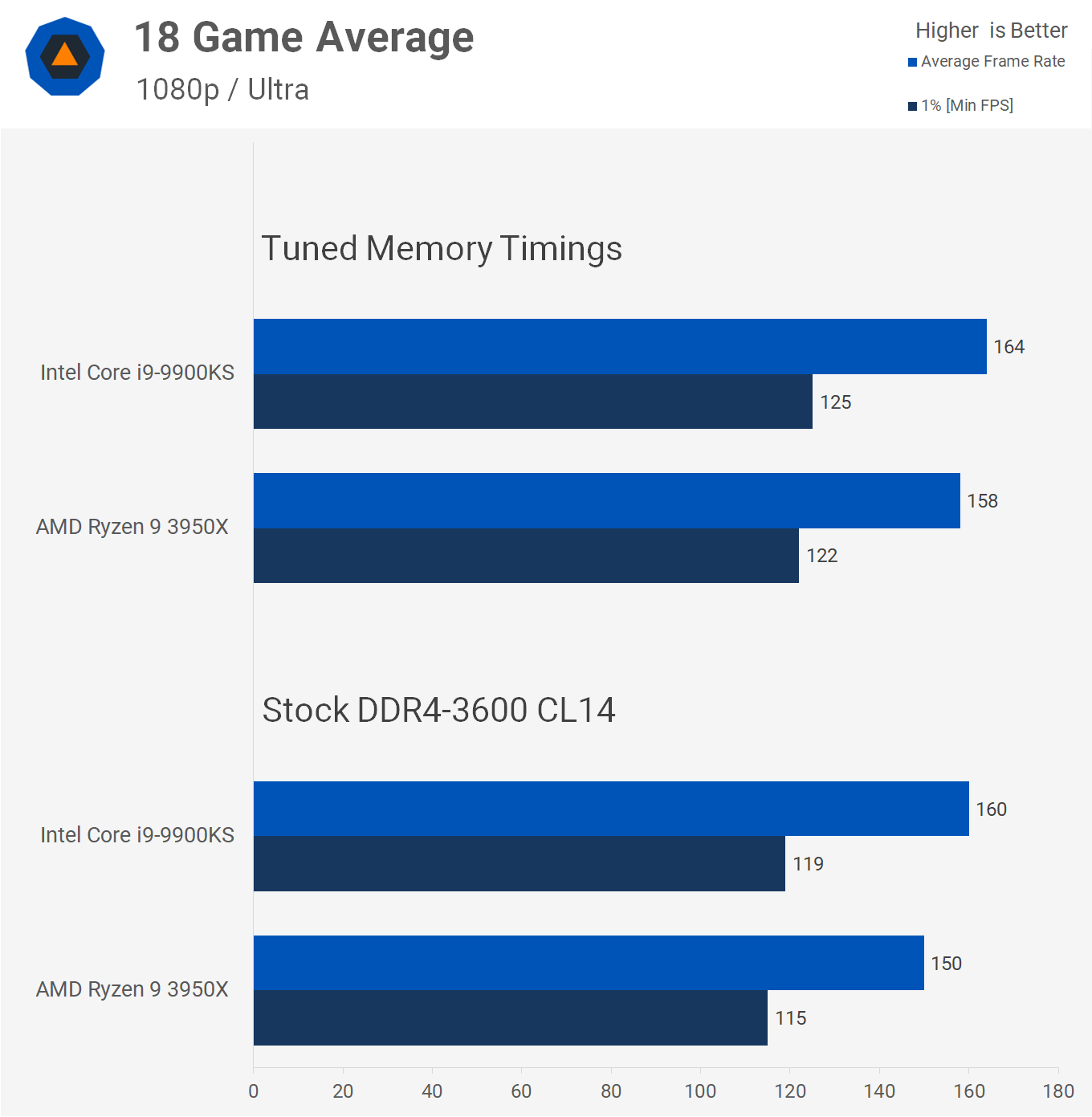
Out of the box the 3950X was found to be 6% slower on average when compared to the 9900KS, exactly the same margin seen between the 3900X and 9900K when using the slower DDR4-3200 memory (data from a previous review). Then with the tuned memory the 3950X was 4% slower on average which for all practical purposes is virtually an identical gaming experience in all modern titles.
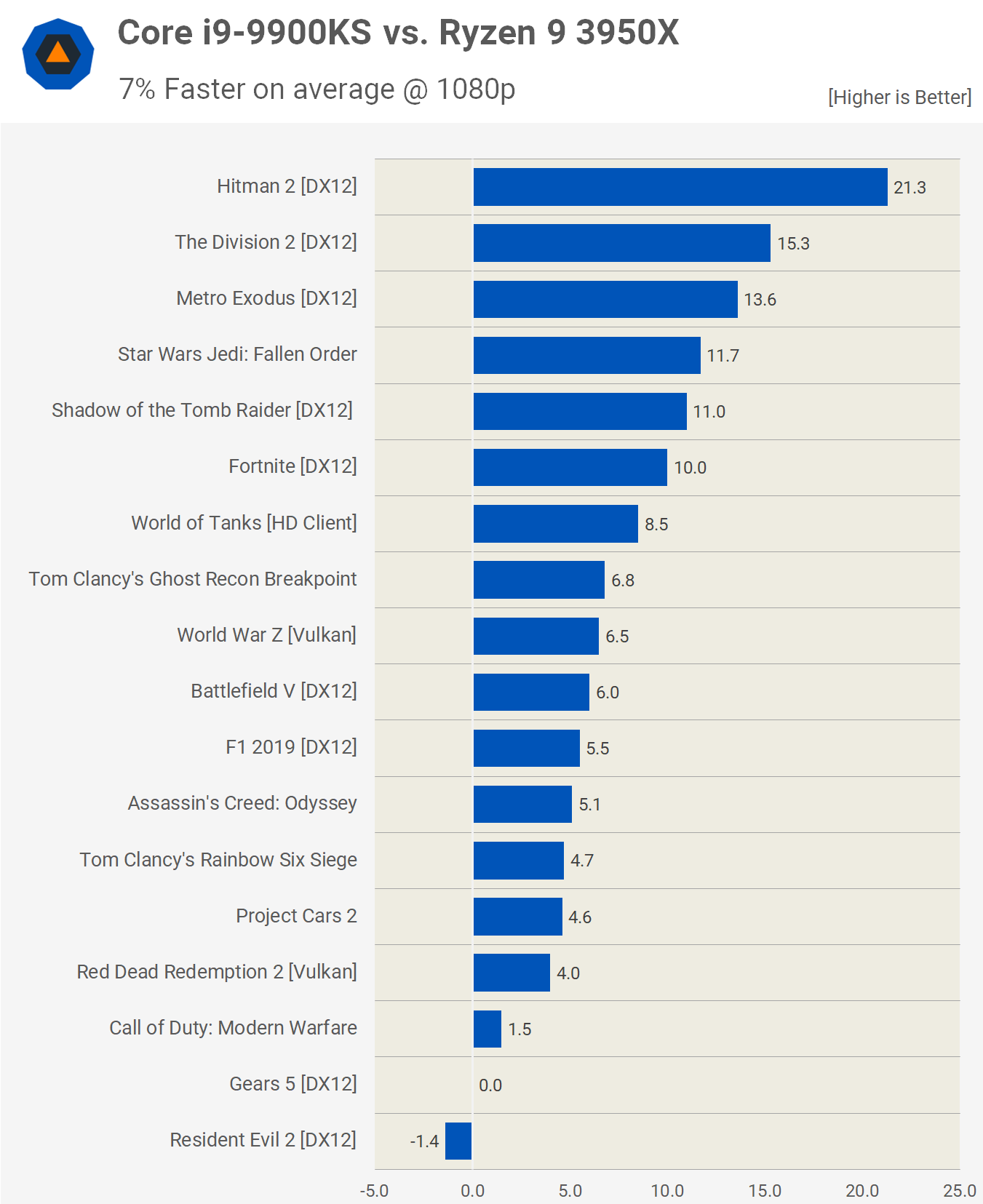
Here's a closer look at the performance difference on a per game basis, stock the 9900KS was 7% faster which as we just saw meant the 3950X was 6% slower. Out of the box the bigger wins for the 9900KS were seen in Hitman 2, The Division 2, Metro Exodus, Star Wars Jedi Fallen Order, Shadow of the Tomb Raider and Fortnite.
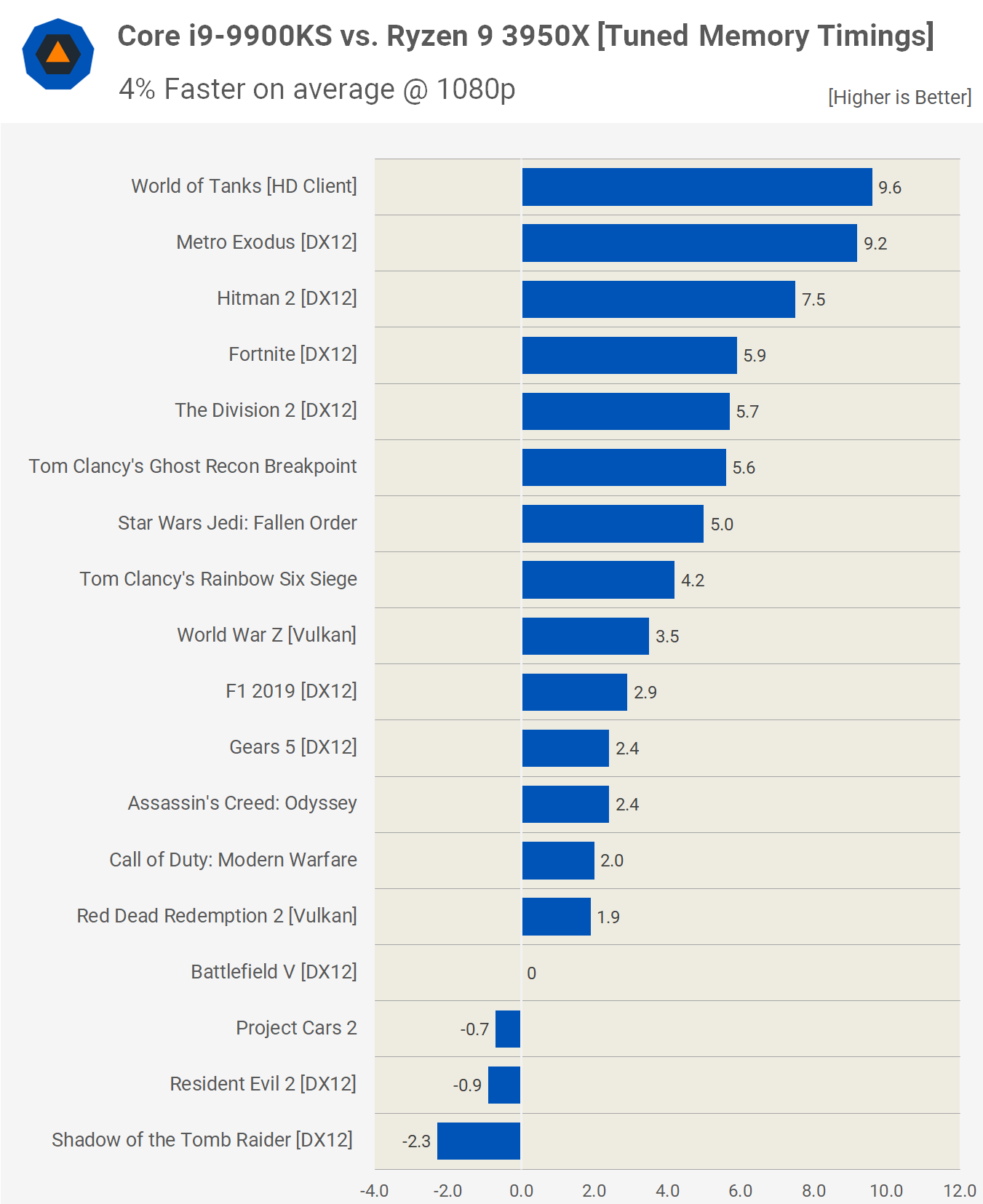
Now with both CPUs utilizing the tuned memory timings the 9900KS was just 4% faster on average and this time it's World of Tanks, Metro Exodus and Hitman where Intel sees its biggest wins. We see a big change for Shadow of the Tomb Raider, so let's take a closer look at the gains Ryzen received from the tuned memory.

Across the 18 games we tested, the 3950X saw a relatively minor 6% performance improvement on average from the tuned DDR4 memory. The only double digit gains were seen when benchmarking Hitman 2 and Shadow of the Tomb Raider, that's about it. Moreover, just half the games tested saw less than a 5% performance increase with the faster memory.
Wrap Up
There you have it, if you've ever seen or become part of a discussion involving tuned memory and today's mainstream flagship CPUs, the Ryzen 9 3950X and Core i9-9900KS (or the regular 9900K), these benchmarks comparing stock and tuned gaming performance should give you plenty of arguments.
The stock results were impressive on their own with the Trident Z Neo memory. If you were using memory with looser timings and more headroom for tuning, at least relative to the out of the box timings, then the gains would be more extreme. As we noted earlier, if you're spending over $500 on your CPU and presumably $1,000 or so on the GPU, then springing for premium DDR4 memory probably isn't a stretch.
But if you are buying a more affordable CPU such as the Ryzen 9 3900X or even one of the Ryzen 7 models, what we've found is that you don't need to invest in premium DDR4 memory. We confirmed this in our 3rd-gen Ryzen DDR4 memory scaling benchmark. Then we used realistic gaming conditions (not 1080p with an RTX 2080 Ti) and the improved memory performance had little to no impact on frame rates.
This testing also confirms the Core i9-9900K remains a top gaming CPU and the fastest for the price. However, we wouldn't call it the ultimate solution simply because it doesn't hold the performance crown by a significant margin.
When compared to the 3900X which costs about the same, it's ~5% faster on average for gaming, but the Ryzen 9 comes with a cooler and it's miles faster in core heavy applications, anywhere from 20 to 60% faster. We also believe the extra cores will future proof the Ryzen better, but that's probably less of a concern for those buying now as you'll likely upgrade in 3 to 4 year's time.
Shopping Shortcuts:
- Intel Core i9-9900KS on Amazon
- Intel Core i9-9900K on Amazon
- AMD Ryzen 9 3950X on Amazon
- AMD Ryzen 9 3900X on Amazon
- AMD Ryzen 7 3700X on Amazon
- AMD Ryzen 5 3600 on Amazon
- Intel Core i7-9700K on Amazon
- Intel Core i7-8700K on Amazon
- GeForce RTX 2080 Ti on Amazon
- GeForce RTX 2070 Super on Amazon
- AMD Radeon RX 5700 XT on Amazon
- AMD Radeon RX 5700 on Amazon
